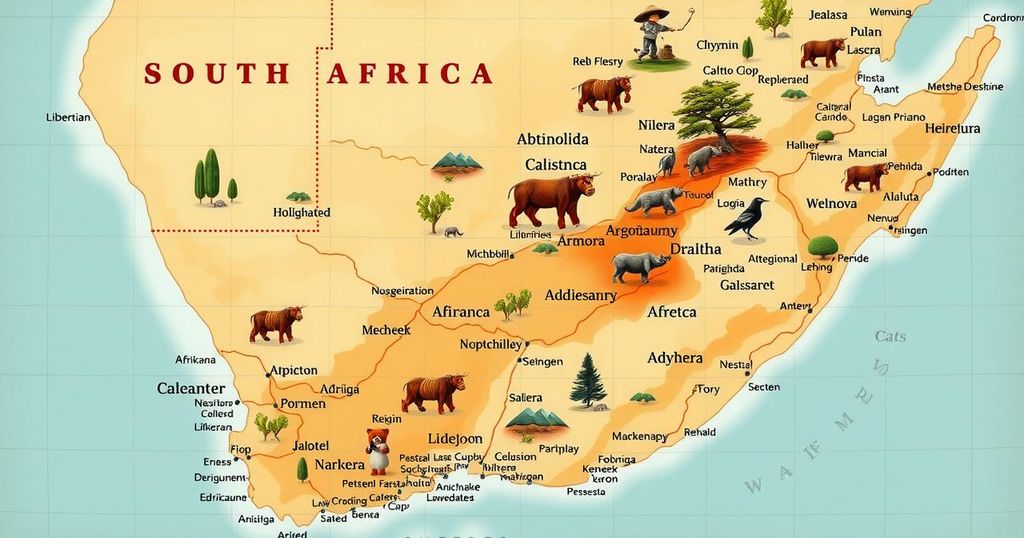Trump Welcomes Afrikaners as Refugees Amid Controversy Over Discrimination Claims
President Trump has announced that a group of about 60 white South African Afrikaners will be admitted as refugees, despite a broader suspension on refugee admissions. This decision is met with controversy, as the South African government disputes claims of racial discrimination made by Trump and his administration. The historical backdrop of apartheid and current land policies contribute to the complexities of this situation as the Afrikaners’ arrival nears.
In a recent turn of events, President Donald Trump has announced an exception to his refugee admission policies, allowing a group of white South Africans known as Afrikaners to enter the United States. This move comes as the administration halted regular refugee admissions, claiming that the Afrikaners have faced significant racial discrimination in their home country. Alongside that, about 60 members of this minority community are expected to arrive on May 12 as designated refugees.
Historically, Afrikaners, who have roots in Dutch colonialism, were part of the ruling class during South Africa’s apartheid era, a system that enforced racial segregation until its abolition in 1994. Currently, this ethnicity constitutes a minority within South Africa’s population and claims to experience unfair targeting under a new government law that allows for property seizure with little or no compensation.
Trump’s interest in aiding the Afrikaners began during his first presidential term but gained momentum following the enactment of the Expropriation Act. This law has faced scrutiny, as it empowers the South African government to expropriate land ostensibly for public interest. Trump has vocalized concerns regarding the treatment of Afrikaners, alleging that the South African government is “confiscating land, and treating certain classes of people VERY BADLY.”
The executive order, signed by Trump in February, aims to prioritize the resettlement of Afrikaners fleeing what the administration labels race-based persecution. In defending this action, White House deputy chief of staff Stephen Miller remarked that such circumstances reflect the very reasons for establishing the U.S. refugee program. He emphasized, “This is persecution based on a particular characteristic, in this case, race.”
Interestingly, prominent figures like Elon Musk, a South African-born entrepreneur, have criticized the Expropriation Act, aligning with Trump’s stance. The U.S. has also taken steps to reduce foreign aid to South Africa amid these controversies.
In terms of demographics, approximately 3 million Afrikaners reside in South Africa, many of whom have Dutch or Huguenot ancestry. Overall, South Africa’s demographic landscape is predominantly Black, with around 81% of the population, totaling 62 million people. Disputes have arisen, however, with South African President Cyril Ramaphosa rejecting Trump’s claims. Ramaphosa asserts that policies like the Expropriation Act are vital to correcting the disparities rooted in apartheid’s legacy.
According to a study from The Africa Institute and the University of Zambia, the wealth disparity is stark, with the average Black household possessing a mere 5% of the wealth of an average white household. The South African government has dismissed accusations of racial discrimination, stating that those claims are “unfounded.”
The Ministry of International Relations and Cooperation expressed regret over the political implications surrounding the resettlement of Afrikaners as refugees. They argued the move seems designed to undermine South Africa’s constitutional democracy.
On the operational side, reports indicate that the 60 Afrikaners arriving on May 12 will do so under the auspices of a State Department-chartered aircraft, with a news conference anticipated at Dulles International Airport. While the State Department has refrained from confirming the exact number of refugees being processed, officials acknowledged ongoing interviews taking place in Pretoria, indicating an active effort to facilitate their relocation to the United States.
The situation concerning the resettlement of Afrikaners in the United States is steeped in historical context and contemporary political debates. While Trump positions their arrival as a response to alleged discrimination, the South African government argues against these claims, framing the issue within the legacy of apartheid and restitution policies. As the May 12 arrival date approaches, the implications of this refugee status for both the Afrikaners and the broader political landscape remain to be seen.
Original Source: www.usatoday.com




Post Comment